Having worked with a leading provider of legal services as a Fractional CMO, I know firsthand that having a strong online presence can be essential to help law firms attract new clients. Plenty of lawyers I have known spend a lot of money on Google Ads to generate leads. Search engine optimization (SEO), on the other hand, can help legal professionals improve the visibility of their website on search engines, which makes it easier for potential clients to find them without having to shell out for paid ads.
In this guide, I cover everything you need to know about SEO for lawyers. From keyword research and on-page optimization, to local SEO efforts and content marketing, I have something here for you. Whether you are a solo practitioner or a large SEO firm for a criminal lawyer, the strategies I have put together will help you drive more traffic, generate more leads, and ultimately grow your practice.
Let’s get started!
What is SEO for Lawyers and Why Is It Important?
SEO for lawyers and law firms differs from general SEO primarily for the intensity of the industry, and the types of services being offered. Unlike many other industries, in which you are regularly chasing repeat business, a lawyer’s office or law firm may not be chasing repeat customers as much as they are interested in developing new contacts.
The likelihood of needing an incoming stream of new people with a low chance of repeat customers means that a law firm SEO agency is going to focus on some different keywords and relevant content in order to meet marketing goals.
The Importance of SEO for Lawyers and Law Firms
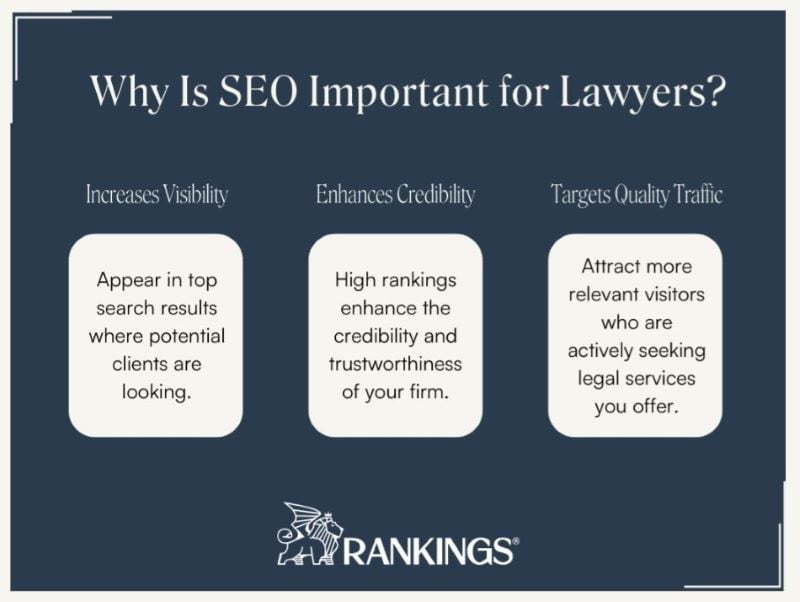 Source
SourceThe legal field is a particularly rigorous one, absolutely saturated with competitors eager to take on prospective clients. The highly competitive nature of the legal field as a whole makes it absolutely essential to develop specific SEO for law firms. Online searches for legal services continue to grow, so being easily reached and quickly recognized is essential for law offices looking to expand their client base.
The Many Benefits of SEO for Legal Professionals
Coming up in an organic search query is extremely valuable in bringing in new potential clients. Lawyer’s offices can enjoy increased visibility and credibility when they come up more quickly in search results. Prospective clients are ultimately looking not only for a reliable lawyer’s office, but are also likely looking for a seamless user experience and some degree of ease. When you come up quickly in search engine rankings, you may be able to attract more clients organically, without relying primarily on paid ads.
Now that you understand the benefits, let’s look at how you can put my advice into action.
Keyword Research for Legal SEO
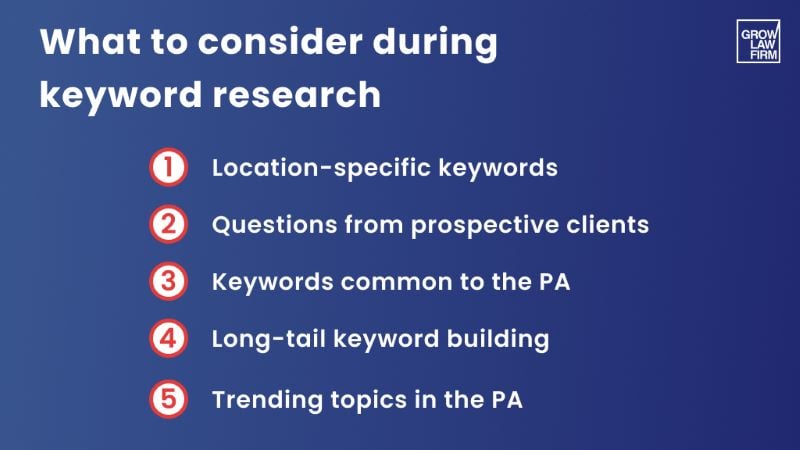 Source
SourceSEO begins with keyword research.
Keyword research is a type of research that focuses on important words found in your niche, and even more pointedly, within your audience or target audience. Keyword research can help you identify what exactly potential clients are looking for, and can help you develop search engine optimization techniques to reach those clients.
Keyword tools like Google Keyword Planner, SEMrush, and Ahrefs can all help marketers identify valuable keywords within their niche. Prospective clients who then search those terms will more readily be able to find you, making SEO for law firms an invaluable tool in gathering new clients.
Keyword tools are only the first part of the equation, however; there are 3 techniques marketers should employ as they go about generating keyword research. These refining techniques include understanding client intent, prioritizing long-tail keywords, and completing a competitor analysis. I have broken each of these down into actionable insights to add to your SEO tactics below.
Understanding Client Intent
Although keyword research may initially seem simple enough–find relevant keywords, include those target keywords in your content, and call it a day–there are actually many different types of keywords, and showing up in organic search results means understanding how these different types work, and how they relate to your audience.
Informational keywords, for instance, are those that focus on information. These keywords might be found in basic informational articles, in landing pages, and in blog posts. They are the words that searchers will enter if they want to learn more, or want guidance on a particular topic.
Transactional keywords are keywords that you might find in searches when a client has decided to make a purchase or take an action. In the context of a law office, you might find “discount” or “low cost” in the transactional keywords options, or you might find “[type of lawyer] near me.”
Finally, navigational keywords are the keywords used to help searchers find a particular site, or a particular page. These can also include “near me” tags, but can also include keywords using a specific law office, or a specific lawyer.
Long-Tail Keywords
Long-tail keywords are absolutely essential in law firm SEO services. While there is certainly no shortage of search terms to include in your SEO strategy as a law firm, long-tail keywords are useful, because they are not as common, and therefore do not have as much competition. They are also frequently more organic, coming in the form of questions or phrases utilized by searchers. They also let users more closely target their SEO efforts, and can help improve your position in search engine results.
In a law practice, a long-tail keyword might look like “best criminal defense lawyer in [city]” or “criminal defense lawyer near me.” These search terms will help improve the conversion rate of legal practices, as people with strong search intent will be more likely to come across their page.
Competitor Analysis
Competitor keywords are another common target for an SEO agency overall, and the same is true of digital marketing strategy designed for lawyers. Analyzing your competitor keywords can help you refine your own strategy; whether you are working on your own or with an SEO agency, you can utilize analytics on your competitor to determine the direction of your own campaigns and you can more closely refine your keyword strategy.
Doing the above should give you a laundry list of keywords to target.
Overwhelmed by Digital Marketing?
Just released: my new book to help small businesses, entrepreneurs, and marketers master digital marketing in today’s digital-first world.
Drawing on my Fractional CMO experience, Digital Threads simplifies complex strategies into clear, actionable steps for success.
Transform your business today—grab your copy! Click the cover or button below to buy on Amazon.
How do you target them?
Through content, of course!
Content Marketing Strategies for Lawyers
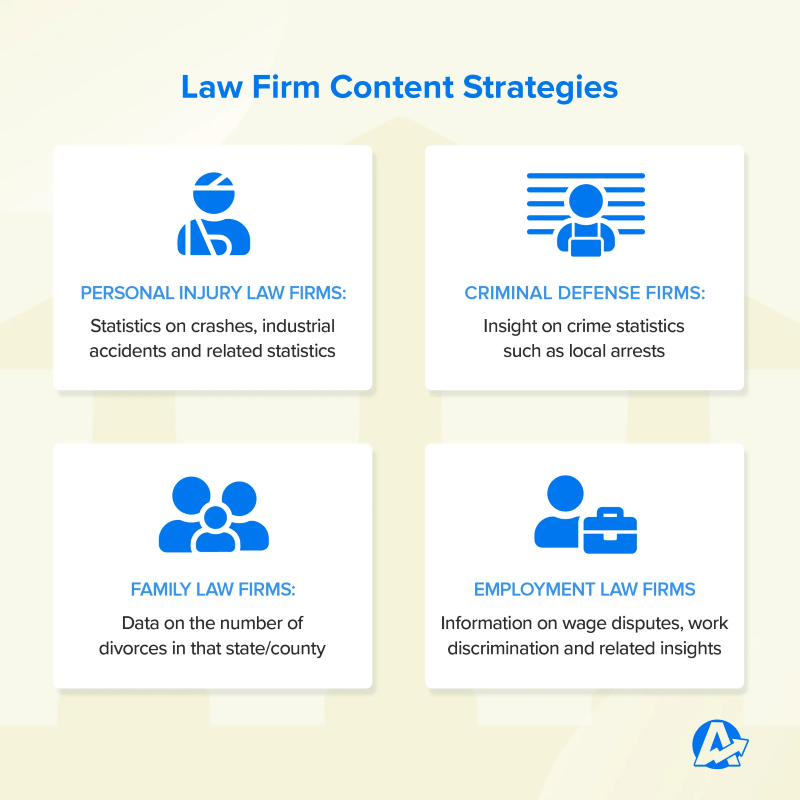 Source
SourceHigh-quality content will always be the simplest and most effective way to account for search intent. In my years working in marketing, the research continually comes up clear: strategic blogging is one of the greatest ways to improve core web vitals, as strategic blogging allows an SEO agency or business to target all of their preferred keywords in an organic, informative, and useful way.
Website content is essential for everyone looking to increase their search volume. Legal marketing is more effective when longer-form content is available to draw search engine users in, and blogging provides an excellent avenue through which to make use of those keywords.
Blogging for Legal SEO
Informative blog posts that address common legal questions and concerns can be a great way to establish yourself as a leader in your industry, and can establish a sense of authority to your audience. Using relevant content to indicate that you know what you are talking about is ideal in this realm, as it pulls double duty in supporting SEO efforts and letting your audience know that you are well-informed and capable.
Case Studies & Client Success Stories
Case studies and client success stories can be shared on landing pages and blog posts, to help law firm search engine optimization efforts. These are a great way to appease search algorithms, demonstrate your knowledge and skill in your field, and set yourself apart from your competitors. Business listings in your area may be a dime a dozen, but guest posts detailing case studies and general client success stories can all help your performance metrics, including click-through rates, and can help establish your firm as a cut above the rest.
Video Content & Webinars
Video marketing may not be a common lawyer SEO trope, but law firms can use video marketing to explain complicated legal concepts, answer FAQs, and connect with clients. Online reviews can even be displayed via video, as can webinars used to detail how the legal process works, or what potential clients can expect from your firm.
Updating Content Regularly
Lawyer SEO content needs plenty: high-quality backlinks, a well-designed website to host content with keywords, and relevant content. Without consistency, however, lawyers are unlikely to see strong SEO success. Why? Ultimately, your search engine rankings require a steady stream of information and content. Keeping it fresh and up-to-date will improve key performance indicators, establish you more effectively as a leader in your industry, and keep you top of mind in your industry.
On-Page SEO Techniques for Law Firm Websites
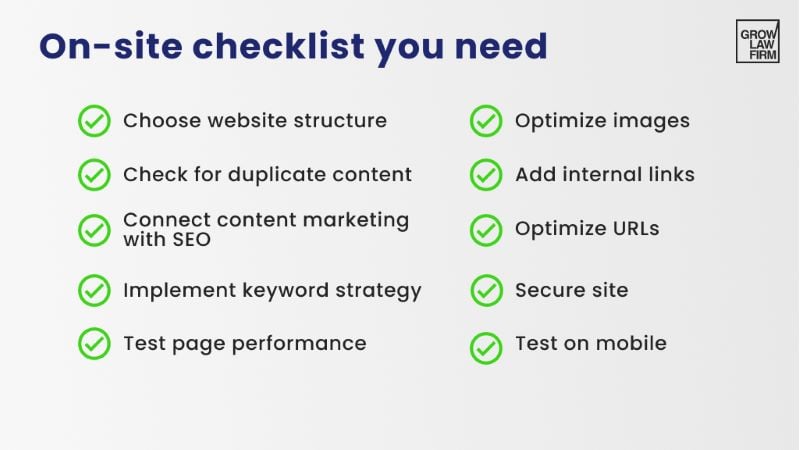 Source
SourceBlog content is a great way to employ keywords and improve your search engine rankings, but SEO specialists in the legal sector can also utilize macro-level supports to help improve blog posts and other content online that is being published at the micro level. These techniques can help direct search engine results to your legal firm, and a successful strategy for law firms should include the following techniques:
Content Optimization
Although consistent, authoritative content is important, it is also important not to neglect your service pages, landing pages, and FAQ pages. Providing clarity and relevance on all of these pages is essential, but keyword usage on these pages is also necessary to see the relevant traffic funneling through your site.
Meta descriptions, title tags, and headers can easily be overlooked, but they can also be useful in improving your search rankings. As you construct your pages or your posts, make sure that you are looking at standard SEO for attorneys, and apply those keywords in your headings, in your meta descriptions, and in your title tags. Doing so will help your rankings on search engines by clarifying exactly what your page or post is talking about.
Mobile-Friendly Design
Mobile search is increasingly common, and every law practice, from a personal injury lawyer to a divorce lawyer, should optimize for mobile to make sure rankings on search engines are ideal. Responsive, mobile-friendly sites improve user experience, and improve ratings.
Fast-loading pages are also important for attorney SEO improvements; the speed with which your page loads can actually impact your search rankings. Removing any unnecessary items from your site pages and making sure your design is clean and easily navigated can make sure that your site loads quickly, and have a positive impact on SEO and user engagement.
Local SEO: Dominating the Local Search Results
All of the advice until now is appropriate for every law firm or lawyer, but many offices operate in certain locales or are sometimes limited by the states in which they practice.
That is why local SEO is particularly important for a law firm SEO company or an in-house marketing team, because a lawyer’s office is going to be focusing most of its energy on reaching people close by.
Unlike online stores and remote services, a lawyer’s office will need to focus in large part on local search results and courting those results. As you maximize for local SEO, consider the following:
Local Keywords
Even if your primary keyword is not location specific, make sure you include city-specific keywords. “Divorce lawyer in Chicago,” for instance, will more effectively direct people to your site. Using locations in your content and your metadata can help search engines direct people to you.
Google My Business
Google My Business (GMB) profiles can also help you rank higher in local searches. Navigate to Google Maps, plug in your address, and follow the steps laid out on Google. Doing this can help your business show up in local searches. The process is quick and simple, but it ensures that your business is appropriately registered in your area.
NAP Consistency
NAP consistency describes consistency in your name, your address, and your phone number. Making sure that all of this information remains consistent across your platforms is critical, as you can lose customers if they are unable to get a hold of you, or they see that numerous numbers claim to offer the same service.
Local Citations & Directories
Local directories, reviews, and citations can also help build trust and improve your local SEO rankings. Making sure that you are registered locally is important, because the vast majority of your business will rely on that local SEO. Although there is some ability to offer legal assistance remotely, a law firm SEO expert will recognize the value of local SEO.
Link Building Strategies for Lawyers
I mention link building further down the list, because having more content to build links to will help you expand your efforts.
Generating backlinks can help search engines see your website and all of the content that you write as coming from someone in a position of authority. To make sure that you are building links well for your site to improve your key performance indicators, focus on the following:
Guest Posting
Guest posting can contribute to legal blogs and publications, and can earn valuable backlinks. Whether you bring someone in who has more experience in a given area, or you bring someone in to guest post who has experience working with attorney SEO questions, you can earn valuable backlinks while bolstering your own site and content.
Building Partnerships
Chambers of commerce can partner with businesses to promote them and foster connection in the local community, and lawyer’s firms are no exception. Law firms can partner with local businesses, as well, and get involved with local charity causes, to make sure their name is continually coming up in their community. Partnerships with chambers of commerce can effectively help an office list in a business directory.
Legal Directories
Legal directories like Avvo and FindLaw can also be a great way to drive traffic to your site and improve your rankings. Some directories allow for negative and positive reviews, to help showcase dissatisfied or satisfied clients, as well. Your name on these directories can help drive traffic and act as a support for your SEO campaign.
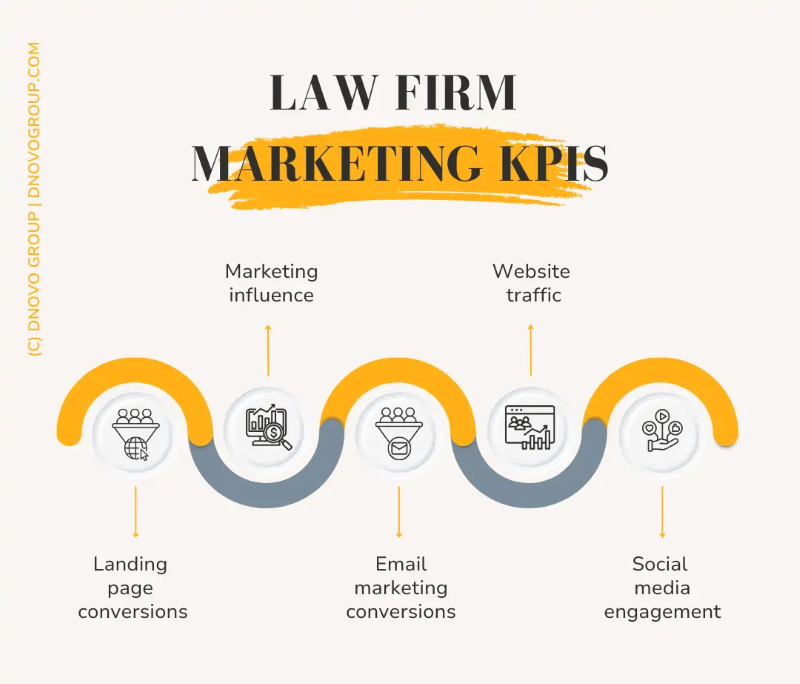 Source
SourceJust as you would never ignore or simply brush aside negative reviews, any good legal SEO campaign will have regular audits on performance to measure your SEO return on investment (ROI). Assess how you are faring when compared to your search engine’s algorithm updates. Satisfied clients rarely come from low-performance SEO, so make sure that your legal SEO campaign is up to snuff and adhering to all best practices.
Key Metrics to Track
Although there are numerous keywords to track, and plenty of items like negative reviews that do not necessarily show up in your metrics, there are also key metrics to check. These metrics are simple enough: organic traffic, keyword rankings, and conversions. Tracking your metrics can help you identify any changes you might need to make to your SEO strategies.
Regular SEO Audit
Legal associations conduct regular audits of their materials, and the digital marketing team of a law team should also complete a regular audit, but for SEO. Legal keywords can change and shift, which means that some of your content might not be performing as well as it used to in the first week or two of completion. For this reason, make sure you are conducting regular SEO audits, to stay on top of any mobile optimization, local optimization, and general optimization that requires updating.
Conclusion
Successfully putting together a strategic SEO approach for lawyers requires you to develop a plan that focuses on building trust, visibility, and engagement. Through optimizing your site, leveraging local SEO, and creating consistent, informative, and high-quality content, law firms can more effectively reach potential clients and grow their practice.
By staying consistent, monitoring your performance, and adapting your strategy, you can keep ahead of your competition. The result will likely be a more robust online presence that drives more inquiries and helps you build a thriving law practice.
Actionable advice for your digital / content / influencer / social media marketing.
Join 13,000+ smart professionals who subscribe to my regular updates.